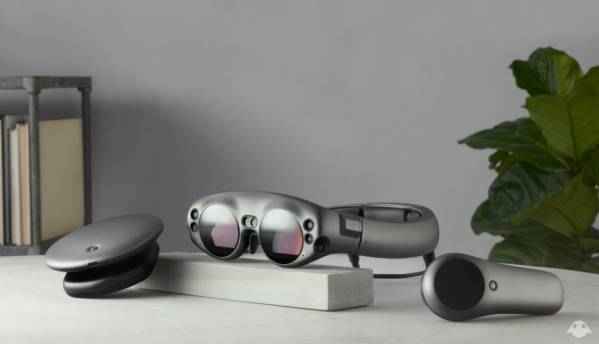Google-backed secretive startup Magic Leap finally unveiled its futuristic AR goggles after three years

Called the Magic Leap One: Creators Edition, the futuristic goggles can work on multiple inputs, comes with a "Lightpack" as powerful as a MacBook Pro and allows you to do things like reading a floating comic book.
The secretive augmented reality startup Magic Leap, backed by the likes of Google, Alibaba, Qualcomm and more, unveiled their first product in three years. Named “Magic Leap One”, the startup calls it a “creator edition” of the head-mounted AR system. It consists of a pair of oversized Goggles, a puck-shaped external device called a Lightpack and a handheld controller.
The goggles is supposed to work with multiple inputs including “voice, gesture, head pose and eye tracking” and maps persistent objects on your environment. For instance, you can “place a virtual TV on the wall over your fireplace and when you return later, the TV will be right where you left it,” according to Magic Leap’s website.
The Magic Leap One goggles will come in two sizes with options of custom forehead, nose and temple pads. The startup is also working on including prescription lenses built into the goggles.
The company invited Rolling Stone to try out the goggles. The publication reported you can make virtual characters react to eye contact, read a floating comic book, watch a virtual live performance using volumetric camera capture.
Magic Leap was reportedly having difficulty to shrink down their tech to fit into the goggles without compromising on the performance. But all that is now quashed apparently as the Rolling Stone reported, “there are no stuttering or slowdowns, even when I walked around the performance, up close and far away.”
The Lightpack houses the computational power of the device and it’s similar in power to a MacBook pro or an Alienware PC, according to the founder Rony Abovitz. There is supposedly another low-powered computer in the goggles to handle world detection and machine learning. There are four built-in microphones, at least six external cameras, built-in speakers, much like Microsoft’s HoloLens.
The goggles sounds a lot like Microsoft HoloLens also, but it supposedly has a wider field of view and be more comfortable.
Magic Leap did not disclose the price of the Magic Leap One or a shipping date. Abovitz has said it will ship in 2018, however, Magic Leap has not had a good track record of being on time. The company had earlier promised to ship an SDK back in 2015. But if reports are to be believed, Magic Leap is finally coming out of its secretive shell and offering real, tangible products built on the technology it has promised for years.
Digit NewsDesk
Digit News Desk writes news stories across a range of topics. Getting you news updates on the latest in the world of tech. View Full Profile




